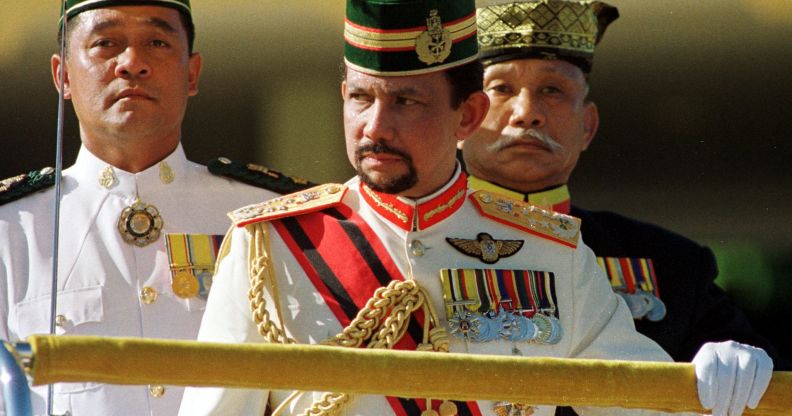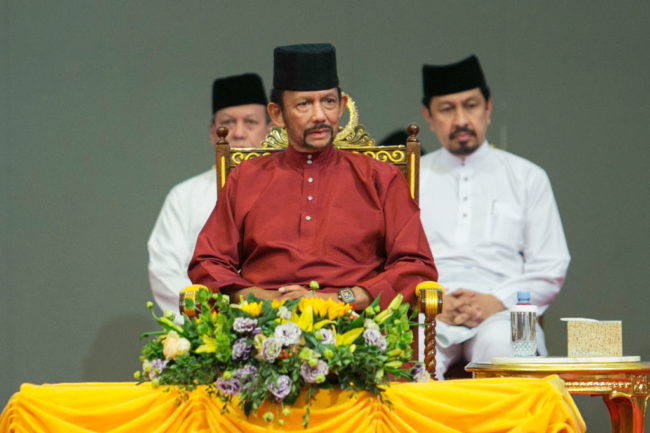Brunei defends death to gays law, claiming executions will be rare

Brunei’s sultan Hassanal Bolkiah. (ROSLAN RAHMAN/AFP/Getty)
Brunei has issued a letter defending its new policy imposing the death penalty for gay sex, claiming executions will be rare.
The country issued a formal letter ahead of a European Union debate on whether the country’s harsh new penal code violates human rights standards.
Homosexuality was already illegal in the country, but the Sharia penal code introduces the death penalty for gay sex and adultery, while lesbian sex is punished with whipping.
Brunei: Death penalty will only apply to men who have sex with Muslims
However, in the April 15 letter, Brunei’s Mission to the European Union claims that “there appears to be a misconception” about the penal code.
The letter claims: “The criminalisation of adultery and sodomy is to safeguard the sanctity of family lineage and marriage of individual Muslims, particularly women.
“The offences, therefore will not apply to non-Muslims unless the act of adultery or sodomy is committed with a Muslim.”
It adds that the death penalty has an “extremely high evidentiary threshold (…) to the extent that convictions may solely rest on confessions of the offender.”

The Sultan of Brunei, who introduced death by stoning for gay people earlier this month (AFP/Getty)
It adds that the punishment of whipping will be conducted with “moderate force.”
The letter goes on to claim that the penal code’s provisions are “not man-made laws but are ordained by Allah,” adding that they are “not to be misunderstood as any kind of radicalisation.”
The country claims it “reaffirms its commitment to its international obligations in promoting and protecting human rights as enshrined in the Charter of the United Nations and the Universal Declaration of Human Rights,” adding: “As a responsible member of the international community, [Brunei] will continue to uphold its obligations and adhere to international covenants on human rights.”
European Union adopts resolution condemning Brunei death to gays law
The letter did not assuage MEPs, who voted in favour of a resolution on Thursday (April 18) that strongly condemns the Sultan of Brunei for human rights violations.
MEP Marietje Schaake said: “The ferocious corporal punishments that have been introduced in Brunei, like punishing gay sex with death by stoning, are repugnant and go against all international human rights legislation.
“Capital punishment could even be imposed on children. We, as Europe, have to respond unitedly.”
The resolution threatens Europe-wide sanctions against Brunei over the law.
Schaake added: “With European measures such as a travel ban and the freezing of financial assets, aimed at the Sultan himself, we [can] really put him under pressure. We also want to blacklist the hotels of the Brunei Investment Agency, owned by the Sultan.”
“It’s time for European leaders to speak out loud, clear and with one voice about the situation in which the citizens of Brunei find themselves. We have to take action now, to show that we stand up for LGBTI people worldwide, and to prevent people from getting hurt.”
Sultan of Brunei stripped of honorary titles over ‘death to gays’ law
In the UK, several honours previously awarded to the Sultan of Brunei Hassanal Bolkiah have been placed under review.
On Wednesday (April 17), the University of Aberdeen announced it had revoked an honorary degree given to the sultan in an “unprecedented” decision.
The Royal College of General Practitioners (RCGP) also unanimously agreed to revoke an honour given to the sultan, and said it would also rename the Brunei Auditorium at its London headquarters.
King’s College London and the University of Oxford have both also said they will review honorary degrees given to the Commonwealth country’s leader.
“We will reconsider this decision through our established process in light of the information now available, as other British Universities are doing,” reads the statement from the University of Oxford.
“At no point has the University declined to reconsider this decision.”
King’s College London said: “King’s is very proud of our diverse community. We take very seriously the concerns raised by our community regarding the honorary degree held by the Sultan of Brunei which was awarded in 2011.
“President & Principal Ed Byrne shares these concerns, and given recent developments has asked the university’s Fellowships and Honorary Degrees Committee to urgently review the award.”

